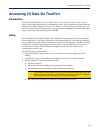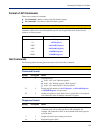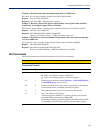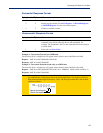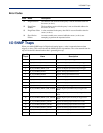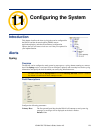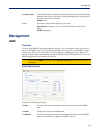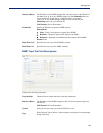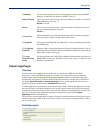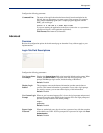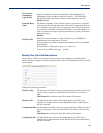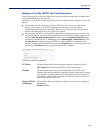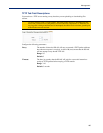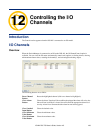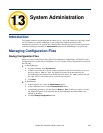
181
Management
Custom App/Plugin
Overview
You can create custom applications for the IOLAN by using the Perle SDK. See the SDK
Programmer’s Guide (the SDK and guide are accessible via a request form located on the Perle
website at
www.perle.com/supportfiles/SDK_Request.shtml) for information about the
functions that are supported. You must download the program and any ancillary files to the IOLAN
and set the
Serial Port Profile to Custom App/Plugin to run a custom application. You must also
specify the program executable in the
Command Line parameter.
A custom application or plugin can be run on the serial port. In this situation, the application will start
once the serial port is activated and operate solely on the context of that serial port and any network
communications related to that serial port. You could run a different custom application on each serial
port. The serial port custom application or plugin is configured by specifying the
Custom
App/Plugin
profile for the serial port.
The system level custom application or plugin will begin execution immediately following the system
startup. It runs on the context of the whole system and can access network communications as well as
any or all serial ports.
Field Description
Community The name of the group that devices and management stations running SNMP
belong to. Community only applies to SNMP v1 and v2c.
Inform Timeout
This is only used for Inform traps. Select the number of seconds to wait for the
acknowledgement of the trap. T
Default: 1 second.
Retires
This is only used for Inform traps. Select the number of times the trap will be
sent if no acknowledgement is received.
Default: 3
V3 Trap User
This field identifies the system sending the traps to the host receiving the traps.
Same user name is used for all traps sent by this system.
V3 EngineID
This is the current Engine ID. The Engine ID is a string which uniquely identifies
this SNMP agent.
V3 Use Default
EngineID
When this field is selected, the firmware will use the default Engine ID. The de-
fault Engine ID uses the MAC address of the Ethernet interface to ensure that the
Engine ID is unique to this agent.
V3 Create
EngineID Using
String
The string entered in this field will be combined with the defined string in hex of
800007AE04 to form the EngineID. Ensure each string is unique for each
IOLAN on your network.



